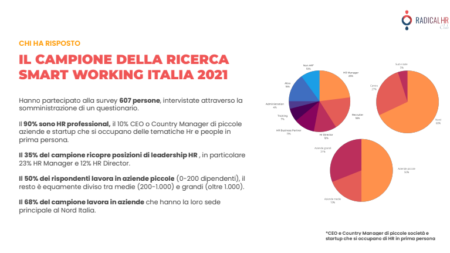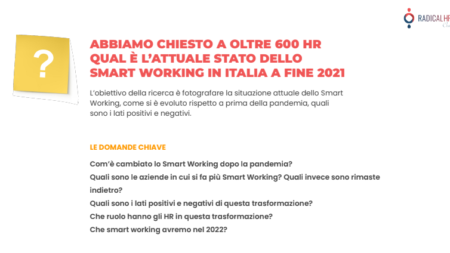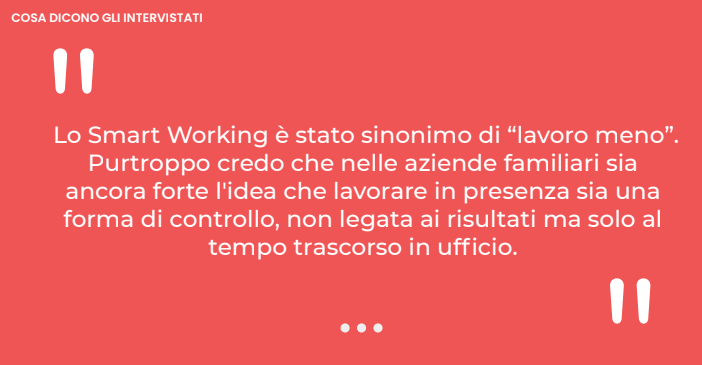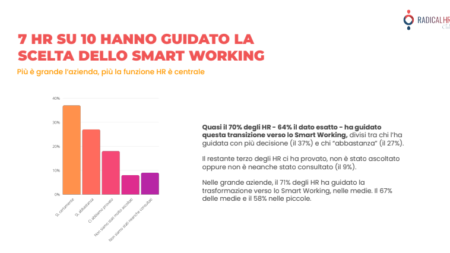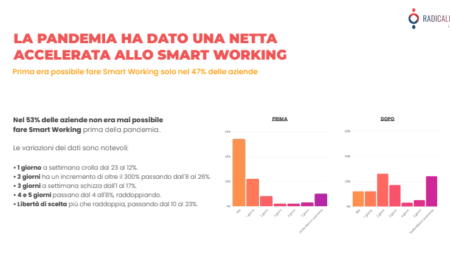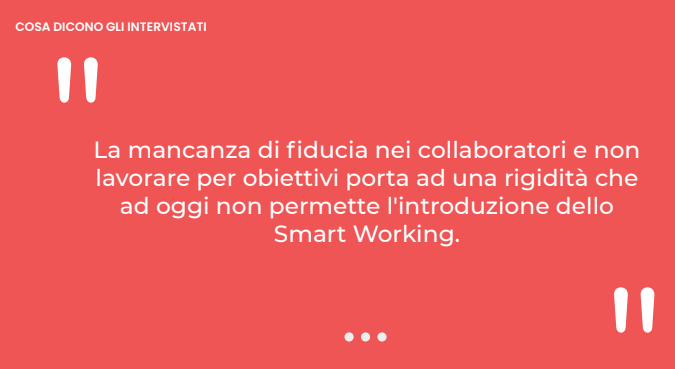
The research “Smart Working Italy 2021 – present and future scenarios” carried out by Radical HR Club was launched last September 2021, in full back to office.
It illustrates how Smart Working has evolved, what characteristics it will have in 2022 and indicates the Human Resource Manager at the core of the transformation that is changing the relationship between company and employees.
The phenomenon that Harvard Business Review has called “The Great Resignation” also highlights that most companies that do not apply smart working are losing talents.
Download the complete research in Italian.
The research took place in Italy and involved over 600 HR; the goal is to photograph the current situation of Smart Working and identify its evolution for the next year, highlighting positive and negative aspects and identifying how companies apply the new ways of working and why some are still reluctant.
The study confirms once again that Agile Work is destined to spread more and more and to become an integral part of the Ways of Working in the near future.
Some data coincide with the 2021 survey of the Osservatorio Smart Working.
The Radical HR Club survey also confirms the acceleration of the Smart Working: if before the pandemic only 47% of companies applied Smart Working, today it has almost reached 90%.
The best data is recorded in Central Italy, where it is possible to do smart working in 91% of companies, compared to 88% in the North.
In the South only 64% of companies can do smart working. In 12% of companies it is not yet possible to do smart working.
The Radical HR Club survey places a particular focus on the role that the HR professional figure had or could have for a real change of corporate culture, for effective communication and for the involvement of employees in this process.
25% of workers are totally free to choose where to work, even if this can prove to be a double-edged sword: people are empowered by trust, but some will tend to isolate themselves, avoiding confrontation (or conflict) with other members of the team.
Among the advantages of Smart Working emerge in particular the improvement of productivity and work-life balance, and the possibility of constant growth for managers and people. The negative aspects remain the isolation, the lack of communication and the attempt of control by the managers.
Thus emerges the central role of HR who must design training programs to work well in Smart Working and new ways to involve and connect employees, listen to their needs, develop a sense of belonging, rethink welfare services. Without training and care, people will leave the company.
“The reassuring data is that 90% of the responding companies do Smart Working, also giving complete freedom and autonomy in the choice and almost 7 HR out of 10 have led this transformation. The less comforting fact is that there is still 35% of HR that is not listened to, there are many companies in which leadership is anchored to old and retrograde thinking patterns. There are companies that lose their talents due to a lack of trust in people “. comments Alessandro Rimassa, founder of Radical HR Club, co-founder of Talent Garden Innovation School.
In fact, it has been shown that companies where smart working is not possible are losing the “battle of talents”. In SMEs, which represent the majority of the Italian productive fabric, the HR role still counts too little: this is demonstrated by the fact that in 4 out of 10 companies the transition towards Smart Working was not led by HR, this puts the capacity at risk of attraction and retention of talents and, consequently, the holding of small companies.
The Harvard Business Review called this phenomenon “The Great Resignation“: the wave of resignations from people who no longer want to work under the working conditions imposed by their companies.
In Italy too, many employees begin to resign from companies where there is no flexibility and freedom to organize themselves and job offers where Smart Working is not provided for are refused.

